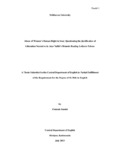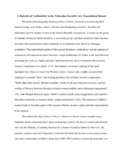Please use this identifier to cite or link to this item:
https://elibrary.tucl.edu.np/handle/123456789/3156Full metadata record
| DC Field | Value | Language |
|---|---|---|
| dc.contributor.author | Paudel, Prakash | |
| dc.date.accessioned | 2021-04-28T09:53:05Z | |
| dc.date.accessioned | 2021-07-23T04:27:26Z | - |
| dc.date.available | 2021-04-28T09:53:05Z | |
| dc.date.available | 2021-07-23T04:27:26Z | - |
| dc.date.issued | 2013 | |
| dc.identifier.uri | http://elibrary.tucl.edu.np/handle/123456789/3156 | - |
| dc.description.abstract | In the aftermath of the 9/11, increased U.S. focus on Iran as a part of the military action dubbed as axis of evil has been justified by some humanitarian acts of defending women’s human rights and liberating them who are living oppressed under Islamic or authoritarian regime. In this context, Nafisi teaches Western literature to let her seven students know about the universality of human rights in general and women’s right in particular. Nafisi’s claim of advocating for women’s right by giving voice to her students is not valid since she has misrepresented them as the most victims in the Islamic regime in Iran who need teaching of Western literature to talk about democracy, freedom and women’s right. So, Nafisi like a typical feminist orientalist that purports to defend freedom, democracy and women’s right but she re-affirms that such values are originated from and accessed through western cultural sources thus is steeped in classic Orientalist stereotypes bolstering the rationale of Western intervention to rescue Muslim women from the repression of Islamic regime. | en_US |
| dc.language.iso | en_US | en_US |
| dc.publisher | Central Department of English | en_US |
| dc.subject | womens | en_US |
| dc.subject | Human Rights | en_US |
| dc.subject | Readings | en_US |
| dc.title | Abuse of Women’s Human Right in Iran: Questioning the Justification of Liberation Narrative in Azar Nafisi’s Memoir Reading Lolita in Tehran | en_US |
| dc.type | Thesis | en_US |
| Appears in Collections: | English | |
Files in This Item:
| File | Description | Size | Format | |
|---|---|---|---|---|
| Cover Page .pdf | 364.68 kB | Adobe PDF |  View/Open | |
| Chapter Page .pdf | 720.65 kB | Adobe PDF |  View/Open |
Items in DSpace are protected by copyright, with all rights reserved, unless otherwise indicated.
